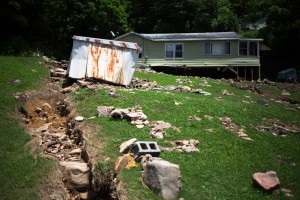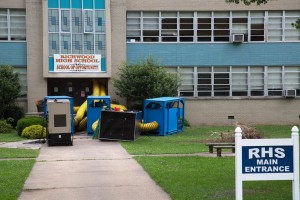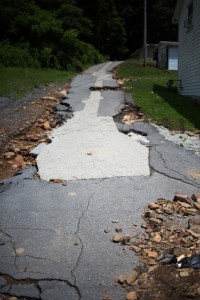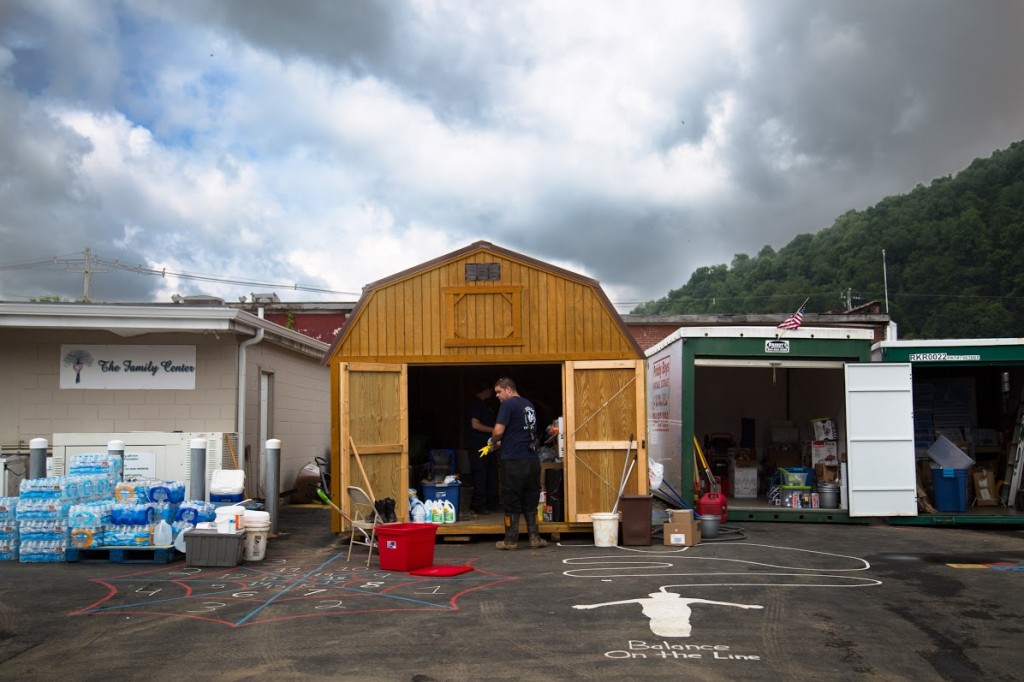This article, published with permission from The News-Gazette and written by Beth Homicz, references alumnus Irvin “Joey” Jones III, a Raphine, Virginia, resident who is providing leadership to Rockbridge County churches partnering in relief efforts for the recent West Virginia floods. Jones graduated in 2010 from the Adult Degree Completion Program with a bachelor’s in management and organizational leadership, and in 2016 with a master’s degree in organizational leadership. He is chairman of the deacons with Faith Mountain Baptist Church.
Photos are provided by Kara Lofton ’14, of Charleston, West Virginia, Appalachia health news coordinator for West Virginia Public Broadcasting.
***
Sometimes neighbors who need help aren’t right next door – but the need becomes so great that good neighbors, even neighboring states, feel they must do whatever they can.
Many Rockbridge area citizens and organizations have jumped into action individually and jointly to bring relief to West Virginia flood victims facing the worst devastation in that state’s history. The Rockbridge area escaped the serious flooding late last month that hit Alleghany County, Covington and parts of West Virginia, including Greenbrier County. Some two dozen people were reported dead in the West Virginia flooding, where Gov. Earl Ray Tomblin declared a state of emergency across 44 counties.

A Rockbridge regional coordination meeting on Friday, July 1, addressed ways to establish a local “clearinghouse” for matching urgent needs with available and forthcoming donations.
Officials of local churches, area government, military units, community services, and emergency management joined forces and pooled information gleaned from their on-the-ground contacts and from delivery trips they’ve been making since shortly after the severe flooding struck on Thursday night, June 23.
For the foreseeable future, officials are welcoming offers of donations and volunteer time from Rockbridge area citizens. But they strongly emphasized the need to check in first with efforts already in place.
Many communities in the hardest-hit areas, for instance, are still desperate for food and water shipments, while others are seeing a surplus of items like bleach. Storage space is unavailable in many flooded-out localities, and there is a shortage of drivers and vehicles to shift existing donations to where they’re most needed. The Red Cross is also very understaffed on the ground as yet.
For the Rockbridge area, the Faith Mountain Baptist Church at 270 Valley Pike – which hosted Friday’s coordination meeting – is serving as the clearinghouse for information, donation collection, and volunteer efforts.
Residents and outside organizations wishing to help, or already planning their own relief initiatives, are asked to contact Joey Jones, chairman of the deacons, to check in and get the most up-to-date information.
Jones said the best way to reach him is via text message to his cell phone at (540) 290-8088, or by email to emailjoejo@aol.com (put “WVA Relief” in the subject line) or to the church’s pastor, Brent McGuirt, at brentmcguirt@yahoo.com. Jones can also be reached via private message through the church’s Facebook page.

“It’s very dire,” said Jones of the situation in West Virginia. “We’ve got to plan things out so that necessary supplies and helpers make it to the right spot at the right time.”
Shocking conditions
During Friday’s meeting, rescue workers reported on conditions observed in the hard-hit areas. First Sgt. Robert Coleman Jr., who works out of a U.S. Army Reserve installation in Covington and commutes from the Mount Atlas area of Rockbridge County, provided a horrifying assessment of conditions on the ground. He began by saying that on the Friday morning following the Thursday night floods, he phoned a colleague who lives in Lewisburg, W.Va., to ask if the man could go check on the Covington facility.
“Are you kidding me? We’re looking for bodies over here,” the man retorted.
Coleman, shocked, resolved to do what he could for the flood victims. He has since become one of the area’s go-to guys for up-to-date information on who most needs what, and where.
On his first trip to offer assistance, that Saturday, he loaded up a batch of filled gasoline and diesel cans in the bed of his pickup and drove to the White Sulphur Springs area, thinking that fuel might be hard to come by in affected areas. At first, he doubted his course of action, because the state police refused to accept the fuel for safety reasons.

But Coleman persisted until he found a rescue squad where members said they had only one ambulance in service, and it was down to 10 gallons of diesel in its tank. He offered the workers the entire 20 gallons he’d brought.
On an ensuing trip to the same community, Coleman said, he was relieved to meet up with one of the rescue squad members and stunned to learn that, shortly after he dropped off the diesel, the squad had responded to a life-threatening 911 call. Without that extra fuel for their ambulance, the workers said, the man they saved would certainly have died.
Coleman and others like him have been making frequent trips to deliver needed supplies to flooding victims. Rockbridge area relief teams soon realized that nearby Greenbrier County was managing comparatively well, due to its relative affluence and name recognition, and its proximity to I-64 and the Virginia border. So workers like Coleman proceeded farther into the Mountain State’s interior, to smaller, more isolated communities like Rainelle, Caldwell and Rupert.
They told of encountering citizens in Rupert last Thursday, nearly a week after the floods, who were barefooted and close to starving, having lost their vehicles to floodwaters and with no means to seek aid or purchase food. National Guard teams were hard at work bulldozing and plowing through mud several feet deep to reopen roads, and had just reached Rupert. But the citizens there had yet to receive assistance in the form of basic life-sustaining needs.
“Without us, people would have perished,” said one helper gravely.
Facing unprecedented devastation, and deprived of basic needs like food, medications, and clean water, and of comforts such as cigarettes and caffeine, many people affected by the floods were “distraught,” rescue workers said. One woman near White Sulphur Springs had lost her husband, her son, and her grandson to the floodwaters – and her daughter was still missing. The family home was gone, too.
Workers thus became aware that grief counselors were going to be required for some time to come. To help answer that need, a group of pastors, including retired Collierstown Presbyterian pastor the Rev. Skip Hastings, is traveling this week to affected communities on a relief mission to bring spiritual comfort and consolation.
But for emergency workers, the most basic physical needs had to take top priority, so organizers devised a logistical system of tiers to rank each community’s need status – from Tier 1, where the most basic items like water, food, baby formula, and cleaning supplies were still in high demand, to Tier 4, where needs were primarily handled and only comfort items were still being requested.

Pet food seemed to be missing from the list of stated needs. At first, organizers hedged on that score, saying that pet items were being covered through other channels. But then they admitted that there was little need being expressed for such supplies – because many pets and livestock had not survived the floods.
On his trips to affected communities, Coleman admitted, he found the silence shocking. He said he had heard a single dog barking. He had seen no animals alive, only a great many dead fish. The smell of death was pervasive, he told The News-Gazette, and so was a deathly silence.
“I don’t think the general public understands the extent of the destruction over there,” said Robert Foresman, county emergency management coordinator. Speaking during Friday’s meeting, Foresman noted that as many as 1,500 West Virginia homes were destroyed or uninhabitable, and thousands of people were believed displaced.
“This is going to take years” for people and their communities to recover, Foresman said. “We’ve never seen this level of destruction … You have to wonder if some of these towns are going to exist after this.”
The Southern Baptist Conference of Virginia, the Rockbridge Area Relief Association, and other participants at Friday’s meeting planned to start up a joint website and a “sister community” program to assist with long-term recovery once the most immediate needs are handled.
Cash donations are also greatly needed and appreciated, said Elizabeth “Jake” Taylor, office manager of the Rockbridge County Sheriff’s Office. Taylor has joined in onsite relief efforts and advised The News-Gazette that monetary gifts to county-level United Way or state Red Cross offices can do great good now for those in need, as funds are used in the localities specified by donors.
A Pentecostal Holiness pastor in White Sulphur Springs, the Rev. Gene Sizemore, is coordinating volunteers for cleanup efforts now that FEMA has performed damage assessments. Interested volunteers can contact Sizemore at (304) 647-8804.
